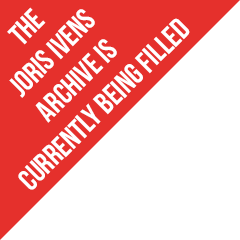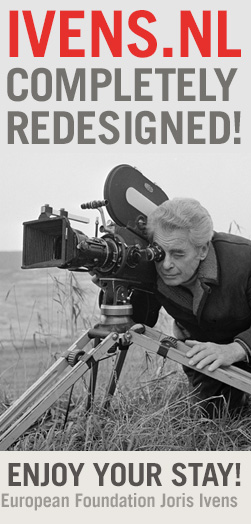

Name curator: Dick Smits
Name artist: George Franju
Title of the work you have chosen: Le sang des bêtes
English title: Blood of the Beasts
Year of production: 1949
Format: 4:3
Watch 'Le sang des bêtes' here, narrated in English.
About the curator
Name: Dick Smits
Function: Owner- founder Filmkenniscentrum
What is your main interest: Movies and getting them to the audience
Where do you come from/ where do you live: Born in Eindhoven, live in Nijmegen, the Netherlands
What can you tell about this film?
This movie impresses, whatever you think of it.
Although George Franju (1912-1987) made a short film Le metro together with Henri Langlois with whom amongst others he founded the Cinématheque Française in 1936, Le sang des bêtes is considered to be his first film. Le sang des bêtes together with the documentaries En passant par la Lorraine (1950) and Hôtel des invalides (1951) are sometimes called Franju’s `slaughter’ films. The last two titles did not glorify the French industry nor militarism (in the aftermath of WW II) but like Le sang des bêtes showed us mankind. In the late fifties Franju turned to making fiction films, Les yeux sans visage from 1960 being his best known movie.
While reading Alfred Döblin’s Berlin Alexanderplatz (1929, written during the aftermath of WW I) I came across a large section called `Denn es geht dem Menschen wie dem Vieh; wie dies stirbt, so stirbt er auch’, eight pages about a slaughterhouse. It was as if reading the movie from Franju that I already knew. The main character from this novel with dadaist and surrealistic features Franz Biberkopf has his own way to struggle through life as it comes.
Between Berlin in Berlin Alexanderplatz and Paris in Le sang des bêtes lies 997 kilometres and WW II.
In the farthest north-west of Paris, just inside the Boulevard Périphérique, the slaughterhouse closed mid seventies, now the area is transformed into the biggest parc in Paris. Has Berlin, Paris or time changed us?
Franju depicts the world: people falling in love, children having fun, city sights and life passing by. But he does so in a surreal context in an open area in the outskirts of Paris with objects taken from their natural environment. Then we are taken away from this to a slaughterhouse. From that moment on, the film spares us nothing of the details of slaughter, disembowellment, dismemberment of horse, cattle, sheep.
Le sang des bêtes mixes surrealism with realism. And despite a voice over Franju primairy concern is with the visuals.
Nobody sees this film unmoved, to say the least. Some can also see filmic beauty. Some online reactions on how the movie is received nowadays: `I cried for two days’; `monstrous’; `no words left’; `we have lost all compassion, all empathy, all integrity, all decency and all moral ethics whatsoever’.
How does this film relate to the theme ‘politics and poetry’ in your opinion?
Le sang des bêtes is a film about the ways in which humans can accept and institutionalise acts of almost surreal cruelty. Franju lets us realize that civilization is constructed upon pain and horror. Nevertheless it is cruelty we know but don’t want to see or know about.
After WW I the trenches, after the WW II the concentration camps, and nowadays the refugees, we don’t want to know that they are and how and were they came from, it is incovenient. The same with the daily food for most of us. As a species, we enslave and kill other species for sustenance. Franju presents this fact without judgment or sentiment in Le sang des bêtes, and he finds a world of poetry and beauty to mediate that hard truth. And then and only then is it where most of the protest, anger and disbelief comes in. Let’s kill the messenger not the message.
The voice over in the movie: “The day is over. In the stalls, the sheep – spared for one more night – silently fall asleep. They won’t hear their prison gates close or the litte train that leaves for the country at sunset to collect new victims for tomorrow. “ and in the same movie : “I will strike you without anger and without hate…..with the simply good humour of killers….Because one has to eat every day and feed others….”
Judge.
Staying on the micro level of the film in our days. The film is sheer poetry. Not of a pleasing kind but of a showing kind. Not pleasant for most of us, confronting, because we don’t want to know, we don’t want to see. We are alienated from our food, especially the non-vegetarians are. We are alienated from a lot but being alienated from our most basic needs is really stunning. And we know this only explicitly because the film shows us. Facing world problems, refugees-migration, environmental, all about our daily lives, if we want to share we have to know where food comes from and how and why we nurture ourselves as we do. This is about not wanting to know that a steak was an animal that is killed, about the fact that one hectare can meet the daily demand for 50 vegans or for 2 carnivors, and about producers who want ownership and monopoly over the planets crops. This is politics. Le sang des bêtes on first sight shows where and how our meat is butchered. The movie doesn’t condemn. It travels slowly through the outskirts from a young couple to a slaughterhouse.
Are politics and poetry (or politics and arts) two separate worlds according to you? Why / why not?
There are a lot of political tensions and changes in the world right now and there have always been. Artists, at least in cinematography, are not the first to react upon present day tensions. This has many causes, economic, social, cultural, artistic etc. And if they react they are carefull. Of course the more experimental, thesmaller the niche the more converging both worlds, as it has always been. As in `the real world’, the majority is silent, which is no judgement on my part. Despite (or because) our global thinking (and local acting) and the informational age we’re living in we’re no protest society anymore and that’s were politics and poetry mostly used to meet and separate. Saying it otherwise the separate worlds have united and don’t excist as such anymore. They are resolved.
Besides the theme of ‘Politics and poetry’ are there any other comparisons between this artist and Ivens according to you?
As often: within certain circles crucified living, hailed death (as a figure of speech) but both remarkable filmmakers.
